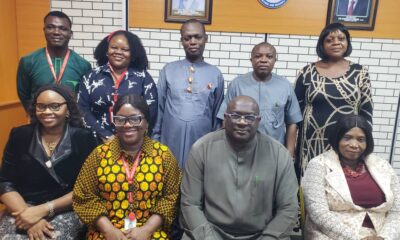Ict/Telecom
MD Harps On Citizen Journalism
Citizen journalism would help government to get feedback from the people on issues and policies affecting them, the Managing Director of the News Agency of Nigeria (NAN), Dame Oluremi Oyo, said in Abuja on Sunday.
Oyo made the observation when the Minister of Communication Technology, Mrs. Omobola Johnson, visited the agency.
She also observed that it was important for government to get feedbacks continually in order to respond appropriately to the yearnings of the governed.
Citizen journalism entails the reportage of events and developments spontaneously by people who witnessed such events.
Oyo said it was in cognizance of the importance of citizen journalism that the organisation would soon begin its practice.
“We’re starting citizen journalism now through the instrumentality of the telecoms organisations and we’ve written to NCC (Nigerian Communication Commission), we’re getting free-toll phones so that people can let us know what is happening in their environment.
“However, we’ll just take it as a tip because we don’t want to carry something that is not right, but the idea is to get us to walk away from the rumour mill and to be able to be authentic in the way we Nigerians see ourselves because it’s also a good way of government getting feedback.
“We have a very strong relationship with Galaxy and we’re happy to say that even our portal was developed by Nigerians; we don’t have to pay money abroad to get all of our things done.
“We are using technology more than anything here. Were it not for technology, we won’t be able to have a virtual private network that connects all our offices.’’
The MD said the agency had embarked on the training of journalists and information officers to improve their capacity to gather and disseminate information.
“We’ve chosen to do training, because if we are able to build the capacity of those who are working in the information sector, it will make our job easier and we in NAN have seen that there is a lot of reward in building capacities.’’
Responding, Johnson said because of the importance of the media in information dissemination, capacity building was top priority.
She said she was impressed that NAN made use of Information and Communication Technology (ICT) to run its business and that it was necessary to use the media to enlighten the people on ICT.
“Having been in public office for almost 18 months now, I think I have a better sense of how important the media is and really it’s about getting out the true story and the true facts.
“You know not a lot of people know that much about ICTs so it’s important for us to engage our citizens through the media.
“I’m really impressed and gladdened by the fact that you really are using ICTs and that’s really the power of ICT.
“Because you operate round-the-clock, you need technology and I’m glad that Galaxy is working with you and supporting you to ensure that you do all these.
“There is a need for capacity building; there are many young journalists that are out there, that are literarily just thrown there by the media houses.
“I see that there are some gaps in there so I’m really glad that you’ve taken up the responsibility of building capacity within the industry and I think that’s a tremendous challenge you’ve taken on and I really wish you all the very best with that.’’
Johnson pledged to always support the use of ICT in information gathering and dissemination.
Ict/Telecom
Technology, Others Responsible For Nigeria’s Bonga Oil Operations
The Managing Director, Shell Nigeria Exploration and Company Limited (SNEPCo), Elohor Aiboni, said Bonga, Nigeria’s first deep-water asset, has recorded major milestones, due to effective leadership, cutting-edge technology, continuous improvement and collaboration with stakeholders.
She noted that since coming on stream in November 2005, Bonga has maintained a track record of production that saw it achieve one-billion-barrel export on February 13, last year.
In her presentation, titled “The Bonga Journey to a Billion Barrels”, at the ongoing 2024 Offshore Technology Conference in Houston, Texas, United States, Aiboni, said: “SNEPCo is grateful for the contributions of all the parties to the Bonga story and we can all be proud of the milestones.
“Bonga has been consistent. In 2014, nine years after coming onstream, it achieved half a billion barrels of crude and doubled it in 2023. We have worked relentlessly to ensure excellent asset management, project and wells delivery and deployment of technology and innovations in our operations”.
According to her, these factors, “coupled with the supportive partnership of the Nigerian National Petroleum Company Limited and our co-venturers – TotalEnergies, EP Nigeria Limited; Nigerian Agip Exploration; and Esso Exploration and Production Nigeria Limited, make Bonga stand out as a world-class investment case”.
She continued that, “SNEPCo also enjoyed the support of the Nigerian Upstream Petroleum Regulatory Commission (NUPRC) and the Nigerian Content Development and Monitoring Board (NCDMB) in the success of Bonga operations”.
Aiboni also listed the challenges of keeping the Bonga Floating Production, Storage and Offloading vessel full as the asset ages and dealing with unexpected developments with subsea wells and equipment.
She said: “SNEPCo responded with a campaign of operational excellence, which among other initiatives, led to the creation of a programme known as the Bonga Business Improvement Plan that continually reviews and identifies improvement initiatives and drives sustainability in operations and upskilling of staff.
“The Bonga success story has been led by Nigerians who have been managing directors of SNEPCo since it was established in 1993, in a deliberate policy by Shell to develop indigenous manpower for deep-water operations in Nigeria.
“Today, some 97percent of the SNEPCo workforce is Nigerian and overall, Bonga has helped to create a new generation of Nigerian deep-water professionals.
“Our vision at SNEPCo remains to be the best deep-water business, powering growth and achieving net zero emissions in line with Shell’s Powering Progress strategy”.
Ict/Telecom
Banks Cut Borrowing From CBN By 44%
Banks’ borrowings from the Central Bank of Nigeria (CBN) fell month-on-month, (MoM) by 44 percent to N12.16 trillion in April from N21.7 trillion in March.
Analysis of latest data from the CBN shows that the 44percent drop represents the first MoM decline in banks borrowing from since January when it increased by 268.7 percent to N3.6 trillion from N976.29 billion in December 2023.
However, further analysis showed that banks’ deposits in the CBN SDF grew MoM by 118.4 percent to N428.97 billion in April from N196.37 billion in March 2024.
Banks make use of the SLF to access liquidity to run their day-to-day business operations while the Standing Deposit Facility window (SDF) on the other hand, is an overnight deposit facility that allows banks to lodge excess liquidity (money) with the CBN and earn interest.
The decline in banks’ borrowing from SLF may reflect an increase in banking system liquidity and also the decision of the apex bank last year to remove the limit on the remunerable daily placements by banks at the SDF.
According to the CBN Governor, Mr. Olayemi Cardoso, the CBN removed the cap on the remunerable SDF to increase activity in the SDF window and manage liquidity.
Ict/Telecom
Expert Highlights Technology Impact On Fintech Industry Growth
A Financial technology expert, Olatunji Akinrinola, has highlighted the exponential growth of the FinTech industry, which according to him, was driven by technological advancements.
Akinrinola made this assertion in a press release recently, where he stressed that the role of technology in driving this exponential growth in the FinTech sector was very outstanding.
According to him, Technology has revolutionised the way financial services are delivered, making them more accessible, efficient, and inclusive.
“Through innovations such as mobile banking, digital payments, and blockchain technology, FinTech companies have been able to reach a larger population and provided them with access to financial services”, he stated.
Akinrinola emphasised the role of technology in enabling financial inclusion, adding: “Technology has democratised access to financial services, particularly in regions with limited banking infrastructure.
“Mobile money platforms and digital wallets have empowered individuals to conduct financial transactions conveniently and securely, without the need for traditional banking services”.
He also underscored the role of Artificial Intelligence (AI) and data analytics in driving innovation within the FinTech industry, noting: “AI-powered algorithms and predictive analytics have revolutionised risk assessment, fraud detection, and customer personalisation in financial services.
“These technologies enable FinTech companies to provide tailored solutions and mitigate risks more effectively, ultimately enhancing the overall customer experience”.
Akinrinola stressed the importance of regulatory frameworks in fostering the growth of the FinTech industry.
“While technology has accelerated the growth of FinTech, it is essential to establish robust regulatory frameworks to ensure consumer protection and maintain market stability. Regulators play a crucial role in balancing innovation with risk management, thereby creating a conducive environment for the sustainable growth of the FinTech sector”, he stated.
Akinrinola underscored the role of technology in driving the exponential growth of the FinTech industry, saying, “Technology has been a game-changer for the FinTech sector, enabling innovation, expanding access to financial services, and driving economic growth.
“As technology continues to evolve, the FinTech industry will undoubtedly play a significant role in shaping the future of financial services ecosystem”.
Corlins Walter
-
Politics19 hours ago
PDP Nat’l Sec Crisis: S’Court Reserves Judgment, Refuses Anyanwu’s Stay Of Execution
-
News22 hours ago
Fubara Recommits To Wellbeing Of Rivers People
-
Business18 hours ago
Nigeria Lost N120bn To Illegal Charter Operations – Report
-

 Niger Delta21 hours ago
Niger Delta21 hours agoRSG, MWAN Strengthen Partnership To Improve Healthcare
-
Business18 hours ago
Abolish Multiple Taxation In Rivers, Group Urges Govt
-
Politics19 hours ago
PDP Tackles Okpebholo Over Alleged Dwindling IGR In Edo
-

 News22 hours ago
News22 hours agoFubara Urges Rivers People To Remain Peaceful, Law-abiding …As Eze Worlu-Wodo Inaugurates Palace For Akpor Kingdom
-
Business18 hours ago
IWD: DBN Disburses N272b To Women Businesses

